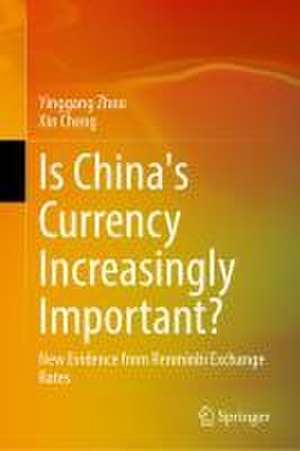Is China's Currency Increasingly Important?: New Evidence from Renminbi Exchange Rates
Autor Yinggang Zhou, Xin Chengen Limba Engleză Hardback – 28 mai 2024
China’s economic achievements laid solid foundations for RMB's international standing. By the end of 2022, China accounted for 18.6% of the global economy and 14.4% of world exports.
However, there is a huge gap between the yuan’s growing prominence and its global use. RMB remains underutilized compared to the U.S. dollar. This book attempts to fill this gap from the view of the systemic importance of the RMB exchange rate, an angle that could be easily overlooked. We argue that pricing is too important to be relegated to an afterthought. The change of RMB exchange rate could have a systemic impact on the global financial system. Furthermore, we present substantial evidence that RMB is gaining importance globally and regionally as an anchor currency and safe-haven currency, indicating that RMB is becoming systemically important despite its relatively limited international use.
It is important to understand in depth that the force that has helped fuel China’s rapid economic growth over the past few decades has been globalization and that market reform and opening up are the pillars of RMB internationalization. Currently, the new trends of anti-globalization and de-financialization have emerged. The global monetary and financial system must be reframed according to the financial needs of socially sustainable activities to prevent systemic instability and system-wide economic/social catastrophes. Against this backdrop, further internationalization of RMB should serve the real sectors in high-quality economic development.
Preț: 724.63 lei
Preț vechi: 883.69 lei
-18% Nou
Puncte Express: 1087
Preț estimativ în valută:
138.70€ • 150.71$ • 116.58£
138.70€ • 150.71$ • 116.58£
Carte tipărită la comandă
Livrare economică 21 aprilie-05 mai
Preluare comenzi: 021 569.72.76
Specificații
ISBN-13: 9789819711635
ISBN-10: 9819711630
Ilustrații: IX, 114 p. 28 illus., 2 illus. in color.
Dimensiuni: 155 x 235 mm
Greutate: 0.36 kg
Ediția:2024
Editura: Springer Nature Singapore
Colecția Springer
Locul publicării:Singapore, Singapore
ISBN-10: 9819711630
Ilustrații: IX, 114 p. 28 illus., 2 illus. in color.
Dimensiuni: 155 x 235 mm
Greutate: 0.36 kg
Ediția:2024
Editura: Springer Nature Singapore
Colecția Springer
Locul publicării:Singapore, Singapore
Cuprins
Chapter 1 Introduction.- Chapter 2 Literature Review.- Chapter 3 Is RMB Becoming Systemically Important?.- Chapter 4 Why is RMB Systemically Important?.- Chapter 5 Is RMB a Safe Haven Currency?.- Chapter 6 Conclusions.- References.
Notă biografică
Yinggang Zhou is currently a professor of Economics and Finance at Xiamen University. He is also the dean of School of Economics and the director of Wang Yanan Institute for Studies in Economics (WISE), Xiamen University. He obtained his Ph.D. in Economics and Finance from both Xiamen University in 2001 and Cornell University in 2007.
His research interests focus on asset pricing, risk management, and international finance. He has published in top-ranked business journals, such as Management Science, Journal of Banking and Finance, Journal of Empirical Finance, and Journal of International Money and Finance. His research has won the best paper awards of Asia-Pacific Association of Derivatives, European Financial Management Associate, and Global Chinese Real Estate Congress and won Chicago Quantitative Alliance Asia (CQAsia) academic competition.
Xin Cheng, Ph.D. in Finance, graduated from the Department of Finance,School of Economics, Xiamen University. She is an assistant professor at the Institute of Chinese Financial Studies of the Southwestern University of Finance and Economics. Her research has been published in Journal of International Money and Finance, Journal of Futures Markets, Journal of Management Sciences in China, China Finance in Chinese, etc. She also hosts a research project on RMB internationalization supported by Youth Fund of National Natural Science Foundation of China.
Textul de pe ultima copertă
China’s economic achievements laid solid foundations for RMB's international standing. By the end of 2022, China accounted for 18.6% of the global economy and 14.4% of world exports.
However, there is a huge gap between the yuan’s growing prominence and its global use. RMB remains underutilized compared to the U.S. dollar. This book attempts to fill this gap from the view of the systemic importance of the RMB exchange rate, an angle that could be easily overlooked. We argue that pricing is too important to be relegated to an afterthought. The change of RMB exchange rate could have a systemic impact on the global financial system. Furthermore, we present substantial evidence that RMB is gaining importance globally and regionally as an anchor currency and safe-haven currency, indicating that RMB is becoming systemically important despite its relatively limited international use.
It is important to understand in depth that the force that has helped fuel China’s rapid economic growth over the past few decades has been globalization and that market reform and opening up are the pillars of RMB internationalization. Currently, the new trends of anti-globalization and de-financialization have emerged. The global monetary and financial system must be reframed according to the financial needs of socially sustainable activities to prevent systemic instability and system-wide economic/social catastrophes. Against this backdrop, further internationalization of RMB should serve the real sectors in high-quality economic development.
Caracteristici
Discusses the role of the Chinese Yuan in the international market under the changing monetary system Measures the global and regional importance of Chinese Yuan using its exchange rates Shows how the international monetary system will evolve using colorful network graphs which is easily understandable
